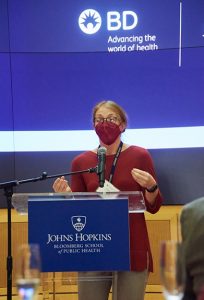
Molecular Microbiology and Immunology (MMI) doctoral candidate Megan Wood could barely contain her excitement. Standing in the Johns Hopkins Bloomberg School of Public Health’s Gallery space, she was about to speak to a group gathered in celebration of Becton Dickinson’s recent donation of state-of-the-art flow cytometry instruments.
The latest generation of Becton Dickinson (BD) equipment had been critical to Wood’s doctoral thesis on arthritis and human autoimmune response at the cellular level. To understand the causes of inflammation, Wood spent hours probing the inner workings of cells, generating exponential amounts of data. The old instruments were too slow to crunch her data, which initially forced her to break up her computer analysis work into multiple sessions.
But BD’s updated flow cytometry instruments seamlessly sorted and processed up to a million cells per minute. “To be able to run large data sets in single computing sessions was fantastic, and to experience the system’s stability — amazing,” Wood told the crowd. And, she added happily, she was on track to submit her thesis in time for graduation this summer.
BD guests who attended the celebration included Puneet Sarin, worldwide president of BD Biosciences; Brooke Story, worldwide president of IDS; and Dave Hickey, president of BD’s Life Sciences Division, who is also a member of the Bloomberg School’s Health Advisory Board. “It is an honor to be among individuals so committed to interdisciplinary research in immunology and public health at one of the world’s leading academic institutions,” said Hickey. “I have the pleasure of serving on the advisory board for the school, and have seen directly the talent, exceptional facilities, and innovative instruments available to progress research and improve public health.”
BD made its first donation of instruments and reagents in 2004 to create what is now known as the BD Immunology and Flow Cytometry Laboratory. Since then, the lab has helped advance public health research efforts by supporting the work of more than 425 Johns Hopkins investigators, approximately 375 different research projects — from COVID-19 to postpartum depression — across Johns Hopkins University, and producing more than 120 scientific publications.
Before BD introduced the first commercial flow cytometer in 1974, it was impossible to efficiently analyze data from large quantities of cells, such as those from clinical samples generated by epidemiological cohort studies. A flow cytometer shoots fluorescent-tagged cells in solution through a laser beam, then records the wavelengths of the scattered light. The resulting patterns provide in-depth quantitative analysis that has become essential for modern scientific and clinical research.
Dean Ellen MacKenzie, SPH ’75 (ScM), ’79 (PhD), opened the celebration by thanking BD for its generous donation to the school, echoing Wood’s comments about how the new equipment was helping to accelerate research. Further, she added, “The extraordinary in-kind donation, totaling over $1.1 million, has a simply incalculable value in the knowledge it will continue to generate and in the training we can offer to our students and postdocs.”
Topics: Alumni, Faculty and Staff, Fuel Discovery, Promote and Protect Health